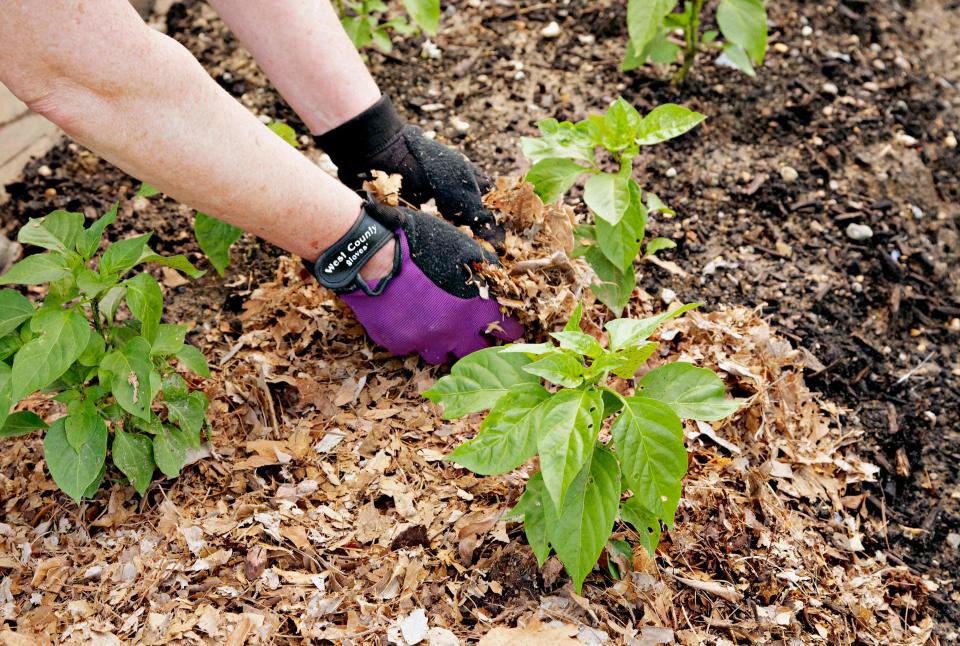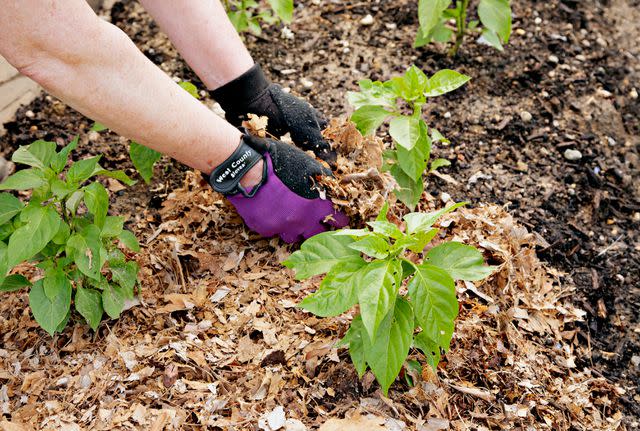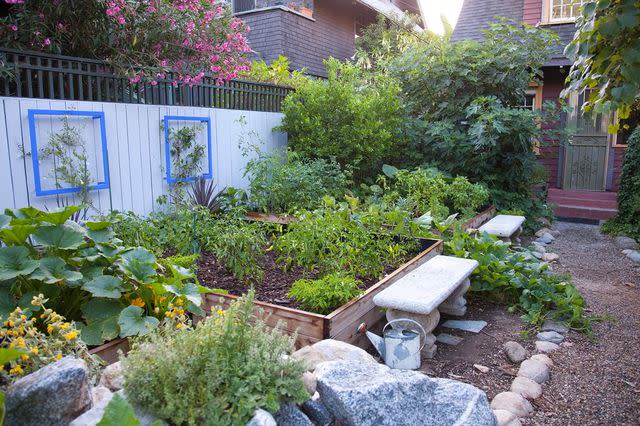5 Best Mulches for Vegetable Gardens
For weed free beds and healthier soil, use one of these all-natural vegetable garden mulches.

Dean Schoeppner
Mulch is one of the most useful products that you can add to garden beds. Not only are mulches help things look tidy, but adding a thick layer of mulch around your plants can keep weeds away and make your garden even easier to care for. Plus, mulch will shield the soil, prevent erosion, slow water evaporation rates, and make your soil even healthier.
But when it comes to vegetable gardens, what is the best type of mulch to use? In this guide, you'll find 5 of the best natural mulches to use in vegetable gardens and what makes each mulch type particularly beneficial.
Related: 9 Ways to Avoid the Worst Mulch Mistakes in Your Garden

Dean Schoeppner
How to Choose Mulch for Vegetable Gardens
While there are a lot of different mulches on the market, not all mulch types are ideal for vegetable gardens. Wood mulches, for instance, are quite popular but they are often better suited for ornamental beds. As the wood pieces break down, they can temporarily bind up nitrogen in the soil, which heavy-feeding vegetables need to grow properly. Plastic mulches, like weed barrier cloth or landscape fabric, are also effective, but they tend to break down when exposed to the elements and create a mess in vegetable beds.
Instead, the best mulches for vegetable gardens tend to be natural mulches that will add nutrients to the soil as they break down. Additionally, because vegetable gardens are often mulched every year, mulches that are easy to come by and inexpensive to use are usually the best options.
Related: How to Mulch Like a Pro
Best Vegetable Garden Mulch Options
Most of these mulches can be produced right in your backyard, which will make mulching your veggie beds that much easier and cost effective.
1. Compost
Compost is one of the best soil amendments that you can use in gardens. It boosts soil nutrient levels and improves the drainage of garden beds. But compost is also a wonderful mulch and it will offer a lot of benefits in the vegetable garden.
Even when used as a mulch, compost will contribute nutrients to the soil and it will boost the activity of beneficial microorganisms and earthworms. Not to mention, finished compost has a nice, dark color and a uniform particle size that can make vegetable beds look even more appealing. And of course, you can make compost right in your backyard or in an indoor composter, so it can be very inexpensive or even free to use.
Related: The 10 Best Compost Bins for Outdoor, Indoor, and Kitchen Countertop Use
2. Shredded Autumn Leaves
If you live in an area where deciduous trees drop their leaves at the end of the season, you have all the ingredients you need to make another quality organic mulch for free. Shredded leaves contain a lot of nutrients that will enrich your soil and enhance earthworm activity. Plus, because many gardeners mulch their planting beds in autumn, fall leaves are particularly convenient because you can gather them just in time for mulching.
Note that unshredded leaves can mat down and prevent water from moving correctly in your beds, so it’s important to shred your leaves before using them as mulch. Leaves can be shredded with your lawn mower if it has a mulching attachment, or you can invest in a mulcher, which will make processing leaves into mulch that much easier. Most tree leaves can be used for mulch; however, black walnut leaves shouldn’t be mulched as they contain a compound that can suppress the growth of other plants.
3. Straw and Hay
Straw and hay are both quite easy to come by and they are usually available at local feed stores and plant nurseries. Both straw and hay work well in vegetable gardens and they are easy to apply and rake away if you want to remove mulch later on. These materials also have a lot of air pockets when used as a mulch, which can provide shelter for beneficial insects and insulation for plant roots during the winter.
One drawback of using straw or hay is that these products sometimes contain weed seeds. To avoid this, be sure to only purchase “weed-free” straw. Hay intended for horses usually has seeds too; however, salt marsh hay is generally weed seed free and it is readily available in coastal areas. Additionally, some straw and hay fields are sprayed with pesticides and herbicides, so if you keep an organic garden, it's very important to know your supplier.
4. Grass Clippings
Whenever possible, it’s usually best to leave grass clippings in place in your lawn to support the health of your grass and redistribute nutrients back into your yard. However, if you have a lot of grass clippings on hand, they can also make an effective, free mulch for your vegetable garden.
Grass clippings contain a lot of nitrogen and they will break down more quickly than some other mulch options, which means this mulch may need to be applied several times a year. Additionally, it’s best to allow clippings to dry a bit before mulching and only apply 1 to 2 inches of grass clippings at a time. Thick layers of wet grass clippings can mat together and cause drainage issues, but thin layers of clippings can make an excellent mulch for vegetable and container gardens. And similar to straw and hay, if you treat your lawn with pesticides and herbicides, those chemicals can transfer to your vegetable garden in the clippings.

5. Gravel and Pebbles
Gravel and pebbles shouldn’t be used directly on vegetable garden beds because these materials can get worked into the soil and will make digging difficult and unpleasant. However, if you have walkways running through your vegetable garden, you may want to cover them up with a layer of pea gravel or pebbles. These materials can be aesthetically pleasing in gardens and they can work with a range of garden styles.
Many gardeners use “no dig gardening” methods in their vegetable beds to keep weeds down and improve soil structure. But one important rule of “no dig gardening” is to avoid compacting garden soil. This is usually done by maintaining walkways or paths through gardens, which keep visitors from stepping directly on the garden soil and compacting it. But walkways can become covered in weeds too. Covering paths with pea gravel or pebbles helps suppress weed growth.
Unlike other mulches, pebbles and gravel won’t break down and they never need to be replaced. That means that your vegetable garden paths will remain weed free for many years to come with minimal maintenance. However, it can be pricy upfront to buy enough gravel and pebbles to cover all your paths thickly enough.
For more Better Homes & Gardens news, make sure to sign up for our newsletter!
Read the original article on Better Homes & Gardens.

